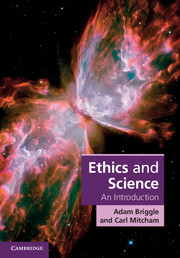Book contents
- Frontmatter
- Contents
- List of figures and tables
- Preface
- 1 Introduction and overview
- 2 Ethical concepts and theories
- 3 Science and its norms
- 4 Research ethics I
- 5 Research ethics II
- 6 Research ethics III
- 7 The science of ethics
- 8 Transition
- 9 Science and politics I
- 10 Science and politics II
- 11 Science and ideational culture
- 12 Science applied
- Epilogue Looking back, leaning forward
- Appendix Ethics codes
- Bibliography
- Index
- References
4 - Research ethics I
Responsible conduct
Published online by Cambridge University Press: 05 November 2012
- Frontmatter
- Contents
- List of figures and tables
- Preface
- 1 Introduction and overview
- 2 Ethical concepts and theories
- 3 Science and its norms
- 4 Research ethics I
- 5 Research ethics II
- 6 Research ethics III
- 7 The science of ethics
- 8 Transition
- 9 Science and politics I
- 10 Science and politics II
- 11 Science and ideational culture
- 12 Science applied
- Epilogue Looking back, leaning forward
- Appendix Ethics codes
- Bibliography
- Index
- References
Summary
Chapter 3 introduced the epistemic and social or behavioral norms in science as a method of knowledge production and as a social institution. These norms were described in general terms by the sociologist Robert Merton as communalism, universalism, disinterestedness, and organized skepticism (known by the acronym CUDOS). In the last quarter of the twentieth century, questions arose in society and among a new generation of social scientists about the extent to which the normative ideals of science actually govern scientific practice. To what extent are scientists really living up to the normative ideals that science seems to espouse? Chapters 4, 5, and 6 examine various realities of science that pose challenges to its ideal normative structure. The present chapter digs into the details of operationalizing the norms of science and considers some of the scandals that have occurred as a result of their breach.
There are numerous ethical issues associated with scientific research, which presents a challenge for organizing them into a logical framework. Alphabetically they range from avoiding conflicts of interest and honesty in reporting results to protecting human subjects and recognizing intellectual property. Positively good scientific practices (GSP) or the responsible conduct of research (RCR) are often summarized under the rubric of scientific integrity or responsibility. Negatively, the official US governmental definition of scientific misconduct identifies FFP (fraud, falsification, and plagiarism) as the most egregious failures. Sometimes specifics are analyzed in terms of professional responsibilities to oneself as a scientist, to the scientific community, or to society as a whole. Another common organizer considers ethical issues in relation to the three overlapping, iterative moments of planning, conducting, and reporting research. This chapter adopts a version of the last organizer and distinguishes anticipating, doing, and disseminating research. But it should be recognized that any such framework is to some extent simply a matter of convenience rather than a natural kind. What is most important is to call attention to a number of specific possible experiences in which there will be ambiguities and dilemmas, temptations to cut corners, or opportunities to exercise strength of character. Critically analyzing these experiences helps to cultivate and reinforce appropriate institutional norms in the practice of science.
- Type
- Chapter
- Information
- Ethics and ScienceAn Introduction, pp. 87 - 124Publisher: Cambridge University PressPrint publication year: 2012

